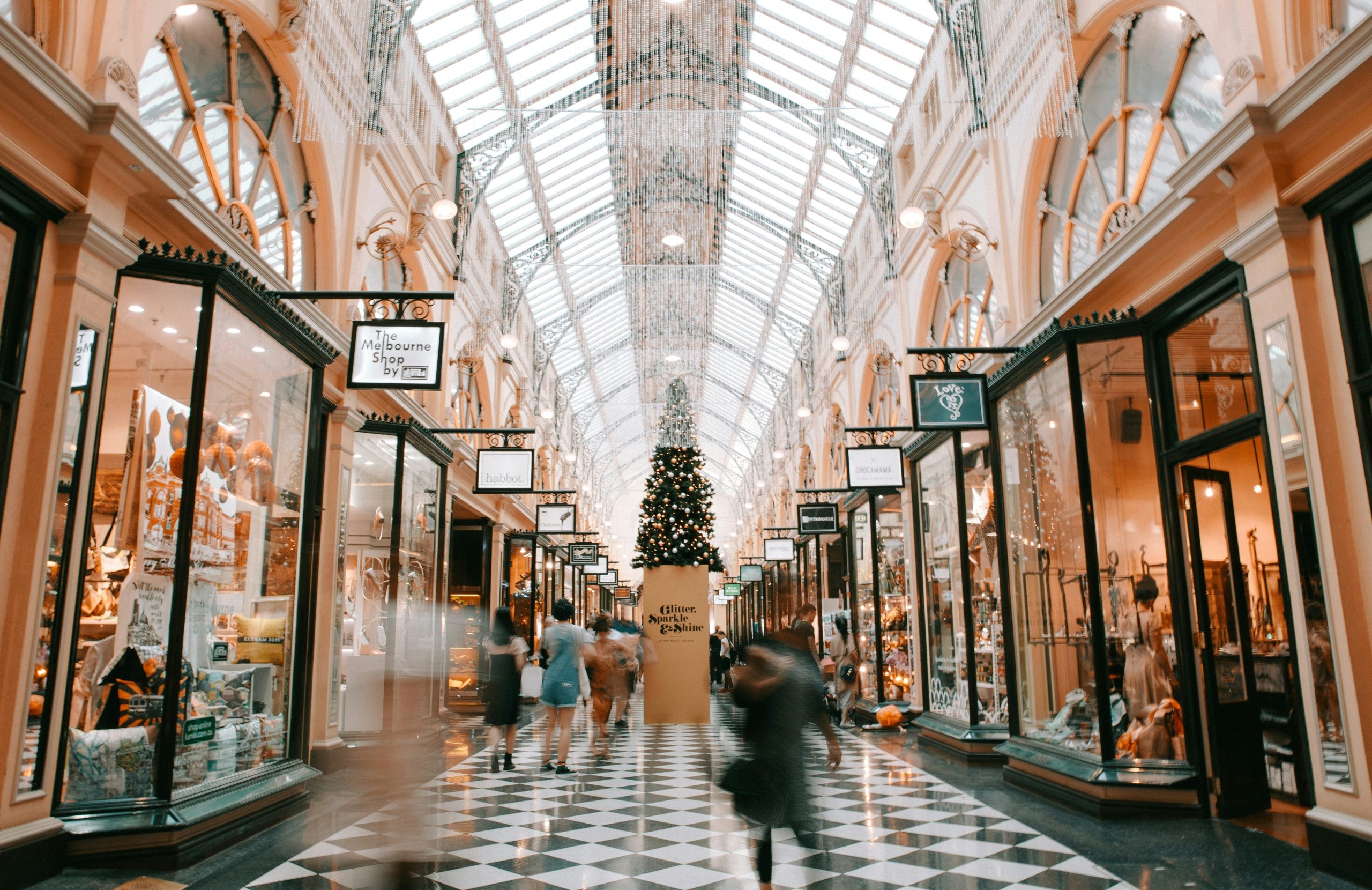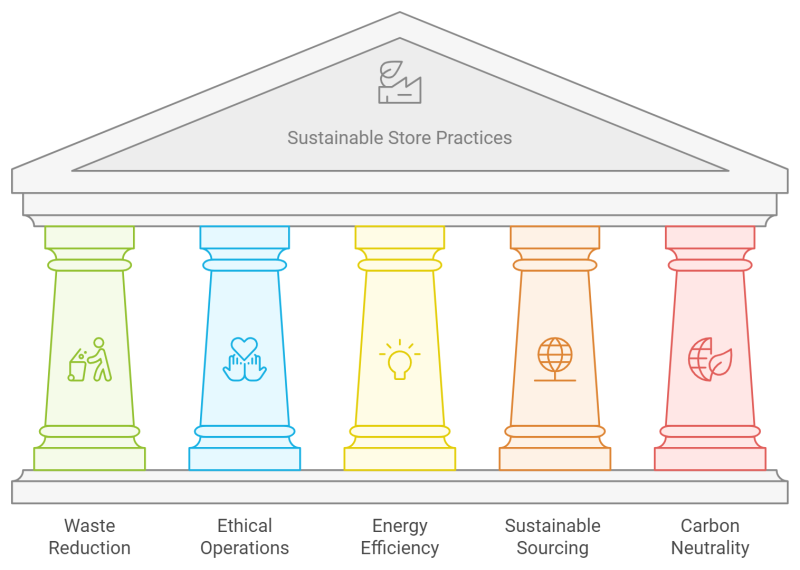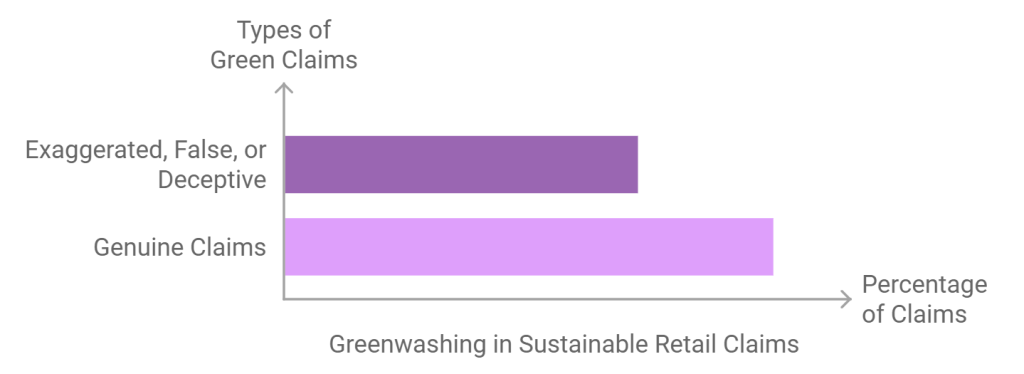By Emma Lester-Devitt, Managing Partner & Co-Founder

In recent years, the retail landscape has undergone a significant transformation as consumers become increasingly aware of the environmental and social impact of their purchasing decisions. This shift has led to a growing interest in sustainable retail practices, with both consumers and retailers adapting to new expectations and responsibilities. This article explores the complex relationship between consumer attitudes towards sustainable retail practices, examining current trends, challenges, and future predictions in the world of eco-friendly shopping.
Introduction
Sustainable retail practices encompass a wide range of initiatives designed to minimise the environmental impact of retail operations while promoting social responsibility. These practices can include everything from reducing packaging waste and implementing energy-efficient store designs to ensuring ethical supply chains and offering eco-friendly product alternatives.
The importance of consumer attitudes in shaping retail sustainability cannot be overstated. As shoppers become more environmentally conscious, their preferences and purchasing decisions are driving significant changes in the retail industry. Retailers who fail to adapt to these changing attitudes risk losing market share to more sustainable competitors.
Current State of Sustainable Retail
Sustainable retail practices are strategies and actions taken by retailers to reduce their environmental footprint and promote social responsibility. Some common examples include:
- Zero-waste stores that eliminate single-use packaging
- Recycling and upcycling programmes for used products
- Energy-efficient store designs and operations
- Ethical sourcing of materials and fair labour practices
- Carbon-neutral shipping options

The sustainable retail sector has experienced remarkable growth in recent years. According to a 2023 report by Deloitte,
“ 55% of UK consumers have reduced their use of single-use plastics, and 45% have chosen brands with environmentally sustainable values or practices.”
This trend is not limited to the UK; globally, the market for sustainable goods is projected to reach $150 billion by 2025, according to a study by Nielsen.
Consumer Awareness and Education
While awareness of sustainable retail practices is growing, there is still a significant knowledge gap among consumers. A 2022 survey by the Retail Industry Leaders Association found that:
“68% of consumers consider sustainability when making a purchase, but only 47% feel they have enough information to make environmentally conscious decisions.”
Education plays a crucial role in shaping consumer attitudes towards sustainable retail. As consumers become more informed about the environmental and social impacts of their purchases, they are more likely to support sustainable practices. Retailers that invest in consumer education through transparent labelling, in-store information, and online resources often see increased customer loyalty and positive brand perception.
Factors Influencing Consumer Attitudes
Environmental Concerns
The growing awareness of climate change and environmental degradation has significantly influenced consumer attitudes. A 2023 YouGov survey revealed that:
“64% of UK consumers are 'very' or 'fairly' concerned about the environment, driving demand for eco-friendly products and sustainable retail practices.”
Social Responsibility
Consumers are increasingly considering the social impact of their purchases. This includes concerns about fair labour practices, ethical sourcing, and community engagement. Brands that demonstrate strong social responsibility often enjoy higher consumer trust and loyalty.
Personal Values and Beliefs
Individual values and beliefs play a significant role in shaping attitudes towards sustainable retail. Consumers who prioritise environmental and social issues are more likely to seek out and support retailers aligned with their values.
Price Sensitivity
While many consumers express a desire to shop sustainably, price remains a significant factor. A 2022 PwC survey found that:
“50% of UK consumers cited cost as the primary barrier to purchasing sustainable products.”
Positive Consumer Attitudes
Despite price sensitivity, a growing number of consumers are willing to pay more for sustainable products. A 2023 IBM study revealed that:
“57% of consumers are willing to change their purchasing habits to help reduce negative environmental impact, with 71% of those willing to pay a premium for brands that are sustainable and environmentally responsible.”
Retailers that demonstrate a genuine commitment to sustainability often enjoy increased brand loyalty. A 2022 Accenture study found that:
“47% of consumers would switch to a brand that supports a good cause, given similar price and quality.”
There's also a growing trend towards supporting local and ethical businesses. The COVID-19 pandemic has accelerated this shift, with 65% of UK consumers reporting an increased intention to shop at local small businesses, according to a 2023 Barclaycard report.
Challenges and Barriers
Greenwashing Concerns

As sustainable retail gains popularity, concerns about greenwashing - the practice of making misleading environmental claims - have increased. A 2022 European Commission study found that 42% of green claims were exaggerated, false, or deceptive. This has led to growing consumer skepticism and demands for greater transparency.
Accessibility and Availability of Sustainable Options
While the availability of sustainable products is increasing, access remains a challenge for many consumers. This is particularly true in rural areas or for specific product categories where sustainable alternatives are limited.
Price Perception of Sustainable Products
The perception that sustainable products are always more expensive remains a significant barrier. While this is often true due to higher production costs, educating consumers about the long-term value and durability of sustainable products is crucial.
Impact on Purchasing Decisions
Consumer attitudes towards sustainability are significantly influencing product choices. A 2023 McKinsey survey found that 66% of UK respondents consider sustainability when purchasing clothing, and 70% consider it when buying food and beverages.
In addition, sustainability is increasingly becoming a factor in retailer selection. Consumers are more likely to shop with retailers that align with their values and demonstrate a commitment to sustainable practices.
Future Trends and Predictions
The importance of sustainability in retail is set to grow further. By 2025, it's predicted that sustainability will be a key consideration for over 75% of UK consumers when making purchasing decisions, according to a forecast by Retail Economics.
Innovative emerging technologies are set to play a crucial role in advancing sustainable retail practices. These include:
- Blockchain for supply chain transparency
- AI-powered inventory management to reduce waste
- Virtual and augmented reality for reduced product returns
- 3D printing for on-demand production
Conclusion
Consumer attitudes towards sustainable retail practices are rapidly evolving, driven by increasing environmental awareness, social responsibility, and personal values. While challenges such as price sensitivity and greenwashing concerns persist, the overall trend points towards a future where sustainability is a key factor in retail success.
For retailers, adapting to these changing attitudes is not just an ethical imperative but a business necessity. Those who can effectively communicate their sustainability efforts, provide transparent information, and offer accessible sustainable options are likely to thrive in this new retail landscape.
As consumers, we have the power to drive positive change through our purchasing decisions. By supporting sustainable retail practices and demanding greater transparency and accountability from retailers, we can contribute to a more sustainable and responsible retail industry.
The journey towards fully sustainable retail is ongoing, but the direction is clear. As consumer attitudes continue to evolve and retailers innovate to meet new demands, the future of retail looks increasingly green.
Follow us on LinkedIn for our latest news.